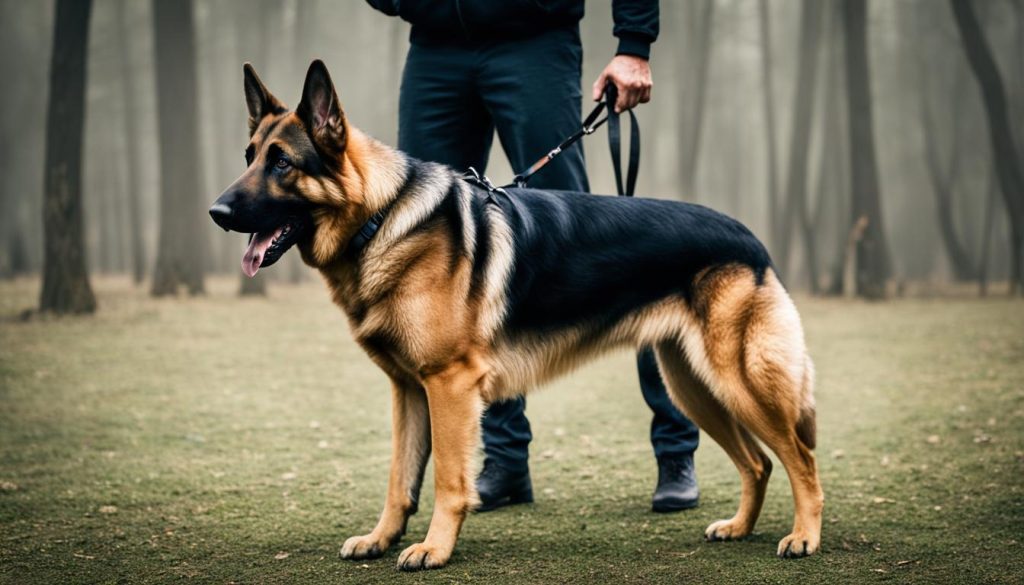Hello, I’m here to shed light on the common issues that many German Shepherd owners face when it comes to their furry friends’ behavior. The German Shepherd breed is often associated with aggression, but it’s important to understand that they are more than just tough and intimidating animals.
German Shepherds are not naturally aggressive, but their protective instinct can sometimes manifest as aggression if they are not properly trained and socialized. This is where understanding their behavior becomes crucial in managing and correcting any behavioral problems they may exhibit.
Training plays a significant role in reducing and preventing various behavioral issues commonly associated with German Shepherds. By understanding their behavior better, we can provide them with the guidance and structure they need to thrive and become well-rounded, lovable companions.
In the upcoming sections, we will delve deeper into the world of German Shepherd behavior, addressing their reputation as dangerous dogs, exploring the most common behavior problems they face, and offering tips on how to effectively train and prevent these issues.
So, join me as we unravel the mysteries behind German Shepherd behavior and equip ourselves with the knowledge to ensure harmony and happiness in our relationships with these incredible dogs.
Are German Shepherds Dangerous Dogs?
German Shepherds are often perceived as dangerous dogs due to their size and protective instinct. However, it is important to understand that aggression in German Shepherds is not inherent to their breed. Like any untrained dog, German Shepherds can exhibit behavioral problems if not properly trained and socialized.
It is crucial to recognize that aggression in German Shepherds is usually a result of environmental factors and lack of training. With the right approach, German Shepherds can be gentle and loving companions.
Proper training plays a key role in managing German Shepherd behavior problems and preventing aggression. By providing consistent, positive reinforcement and setting clear boundaries, owners can effectively shape their German Shepherd’s behavior.

Understanding German Shepherd behavior is essential for managing their behavior problems. As naturally protective dogs, German Shepherds have high energy levels and need mental and physical stimulation. Regular exercise, obedience training, and socialization can help redirect their energy and prevent destructive behavior.
It is also important to note that German Shepherds thrive in a structured environment with a sense of purpose. By providing them with a job or task, such as agility training or obedience competitions, their natural intelligence and trainability can be harnessed in a positive way.
In conclusion, German Shepherds are not inherently dangerous dogs. Through proper training, understanding, and management, their aggression can be prevented. With the right approach, German Shepherds can be loyal, obedient, and loving family pets.
Understanding German Shepherd Behavior Better
German Shepherds have often been portrayed in the media as aggressive and unpredictable dogs. However, these misconceptions are largely due to a lack of proper training and understanding of their behavior. In reality, German Shepherds possess unique qualities and traits that, when properly managed, make them wonderful family pets.
One of the key aspects of understanding German Shepherd behavior is recognizing their intelligence and trainability. This breed is highly intelligent and easily trainable, which means they can quickly pick up on commands and learn new behaviors. With the right approach, German Shepherds can become well-behaved and obedient companions.

It’s important to recognize that German Shepherds may exhibit certain behavior problems if their needs are not met. Lack of exercise, mental stimulation, and socialization can lead to issues such as excessive barking, separation anxiety, and aggression. By understanding these common issues, we can take the necessary steps to manage and prevent them.
Most Common German Shepherd Behavior Problems
German Shepherds are wonderful companions known for their loyalty and intelligence. However, like any other breed, they can also experience behavior problems that require attention and training. By understanding and addressing these issues, we can create a harmonious and balanced relationship with our German Shepherds.
One common behavior problem seen in German Shepherds is aggression. While not all German Shepherds are aggressive, some may display territorial or protective behavior that can become problematic if not properly managed. With consistent training and socialization, aggression can be minimized.
Another issue often faced by German Shepherd owners is leash pulling. These powerful dogs can be strong pullers, making walks stressful and difficult. Training exercises, such as loose-leash walking, can help teach your German Shepherd to walk calmly by your side.
Nipping and biting are behaviors commonly seen in German Shepherds, especially during their puppy stages. While these behaviors are natural for puppies, it is important to address them early on to prevent them from becoming ingrained habits. Positive reinforcement training techniques can be used to redirect their biting towards appropriate chew toys.
Separation anxiety is another behavior problem frequently encountered in German Shepherds. These dogs form strong bonds with their owners and can become anxious and distressed when left alone. Gradual desensitization, providing mental stimulation, and practicing leaving the dog alone for short periods can help alleviate separation anxiety.
The Dog Code: How Understanding German Shepherd Behavior and Personality Help You Train Them Effectively
Understanding the behavior and personality of German Shepherds is essential when it comes to training them effectively. These dogs are highly intelligent, trainable, and naturally protective. To ensure their well-being and obedience, they require mental and physical stimulation, a sense of purpose, and proper socialization.
A vital aspect of training German Shepherds is establishing a bond with them. By building trust and forming a strong relationship, you create a foundation for effective training. Consistency is key in their training regimen. German Shepherds thrive on routine and respond well to clear instructions and boundaries.
German Shepherds are eager to learn and excel in obedience training. These intelligent dogs benefit from tasks that challenge their minds and enhance their problem-solving abilities. Incorporating interactive toys, puzzle games, and obedience exercises will keep them engaged and mentally stimulated.
Proper socialization is crucial for German Shepherds to interact positively with other people, animals, and the environment. Exposing them to different situations, sounds, and experiences from a young age helps to prevent fear or aggression issues later on. Gradual exposure, positive reinforcement, and reward-based training techniques are effective approaches to socializing German Shepherds.
When training German Shepherds, remember to use positive reinforcement rather than punishment. Reward their good behavior with treats, praise, and affection. This approach encourages them to repeat desired behaviors and strengthens the bond between you and your furry companion.
Training a German Shepherd requires patience, time, and consistency. It is essential to remain calm, firm, and assertive while avoiding harsh or aggressive methods. With the right approach and understanding of their behavior, German Shepherds can be trained to be well-behaved, obedient, and loving family pets.
How to Prevent German Shepherd Behavior Problems
Preventing German Shepherd behavior problems is crucial for raising a well-behaved and balanced dog. Early training and socialization play a critical role in shaping their behavior. Starting with puppy training and obedience classes can provide a solid foundation for your German Shepherd’s development.
Consistency is key in managing and preventing behavior problems. Establish clear rules and boundaries from the beginning and ensure that everyone in the household follows them. Consistent training and positive reinforcement techniques, such as rewards and praise, can help correct undesirable behaviors and reinforce good ones.
Another important aspect of preventing behavior problems in German Shepherds is providing them with physical exercise and mental stimulation. These intelligent and active dogs require regular exercise to channel their energy in a positive way. Engaging them in activities like puzzle toys, obedience exercises, and interactive playtime can keep them mentally stimulated and prevent boredom-related behavior problems.
Creating a structured routine is also beneficial for managing German Shepherd behavior. Dogs thrive on routine and knowing what to expect. Establish a schedule for feeding, exercise, training sessions, and rest to provide them with a sense of security and balance. This predictability can help prevent anxiety-based behavior problems and promote overall well-being.






